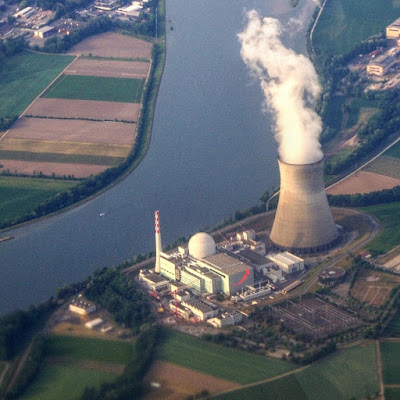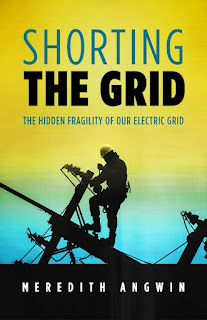 |
| Photo: Hansueli Krapf. Creative Commons |
This week I also started reading Meredith Angwin's Shorting The Grid, a book about the hidden fragility of our electric grid. Like Lewis, she's clearly done her homework. As I go along on this journey into nuclear power and the energy grid I will share some of what I learn.
And guess what? The first chapter of Angwin's book is titled The Big Short.
At the center of The Big Short we see how the banks and Wall Street played games with complex credit instruments. Most people played along with these games taking place in the overheated housing market.
It's understandable how overconfidence created this unrealistic disparity between perceived and real valuations. People with lots of money want to invest in things that offer the most potential gain with the least potential risk. Because real estate values always seemed to go up, everyone assumed this would always be the case.
For decades housing prices were perpetually going up. For example, the house my parents bought for $24K in 1964 was sold for over $100K fifteen years later. Not many years after that the Browne's house next door, which was also purchased for $24K, went for $200K.
Somewhere around 2006 or so I looked on Zillow and saw that our four-bedroom split-level house with partial basement was now valued at $450K. To me, it was just another "used house" but there seemed to be nothing stopping prices from climbing. That is, until all the easy credit started to dry up and people began defaulting on those overblown mortgages.
Because the housing market propped up the wider economy, everything took a hit when the bubble burst. The credit system crashed, and everything else went with it down the toilet.
This story lays the foundation for Ms. Angwin's book because, as she sees it, there are many parallels between 2007 and our current situation with regards to energy.
Most Americans, having grown up enjoying the benefits of electricity, probably take it for granted. We turn on the light with the flick of a switch. We recharge our devices by plugging them into an outlet. But few of us have really bothered to understand how it works or how the utility companies keep our lights on 24/7.
(For what it's worth, I lived in Puerto Rico for a year and experienced what it is like to have weekly brownouts and occasional blackouts. That was long before the more recent hurricane that so devastated our island neighbor.)
In this first chapter Ms. Angwin gives readers a brief overview of how things have been changing with regards to power. We don't notice because for 80 years or more it has almost always been fine. The exception being Texas this past winter.) Nevertheless, things have changed, even if we haven't noticed anything different at the user end. She writes:
In the old days regulatory bodies wanted to see a grid with reliable power plants and, hopefully, plants that use different types of fuels. A varied grid meant that, if one fuel had shortages or rose in price, the grid would still be stable, and costs would remain relatively stable.
In current grid governance, none of these things matter. In many areas power plants that make steady reliable power can’t make a profit. Several large utilities are trying to sell or shut down their nuclear, gas, and coal plants in these areas. These utilities plan to operate plants only in other parts of the country.
She then discusses the Regional Transmission Organization (RTO) which is a thread that will run through the length of this book.
In many areas of the country, especially in RTO areas, power installations that can operate only intermittently, such as solar and wind installations, are the sure bet for becoming wealthy. In the mortgage situation the intrinsic value in the mortgage didn’t matter. In the RTO area, the value of the power produced doesn’t matter. As a matter of fact, less-valuable power is more profitable.
Trouble is sure to come and it’s on its way. In these areas we are on our way to an expensive and fragile grid.
* * *
Unlike Christian Bale or Steve Carrell in the movie version of The Big Short, Meredith Angwin is not a lone voice in the wilderness. In the very short time I've been learning about nuclear power, I encountered quite a tribe of people who "get it." These are people fully committed to clean air, clean water and a safe future for our grandchildren.
The interview I posted yesterday, provides a number of useful insights worth taking into consideration as we discuss the benefits of nuclear energy. Check it out here: Putting Nuclear Power In Perspective: An Interview with David Watson.
Photo at top of page: Leibstadt Nuclear Power Plant, Switzerland

No comments:
Post a Comment